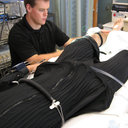Ascorbic acid does not enhance hypoxia-induced vasodilation in healthy older men.
Mo kle
Abstrè
In response to hypoxia, a net vasodilation occurs in the limb vasculature in young healthy humans and this is referred to as "hypoxia-induced vasodilation". We performed two separate experiments to determine (1) if hypoxia-induced forearm vasodilation is impaired in older men (n = 8) compared to young men (n = 7) and (2) if acute systemic infusion of ascorbic acid would enhance hypoxia-induced vasodilation in older men (n = 8). Heart rate, mean arterial pressure, oxygen saturation, minute ventilation, forearm vascular conductance (FVC, Doppler ultrasound), and cutaneous vascular conductance (CVC, laser Doppler flowmetry) were recorded continuously while subjects breathed 10% oxygen for 5 min. Changes from baseline were compared between groups and between treatments. The older adults had a significantly attenuated increase in FBF (13 ± 4 vs. 30 ± 7%) and FVC (16 ± 4 vs. 30 ± 7%) in response to 5 min of hypoxia. However, skin blood flow responses were comparable between groups (young: 35 ± 9, older: 30 ± 6%). In Experiment 2, FVC responses to 5 min of breathing 10% oxygen were not significantly different following saline (3 ± 10%) and ascorbic acid (8 ± 10%) in the older men. Ascorbic acid also had no physiological effects in the young men. These findings advance our basic understanding of how aging influences vascular responses to hypoxia and suggest that, in healthy humans, hypoxia-induced vasodilation is not restrained by reactive oxygen species.


